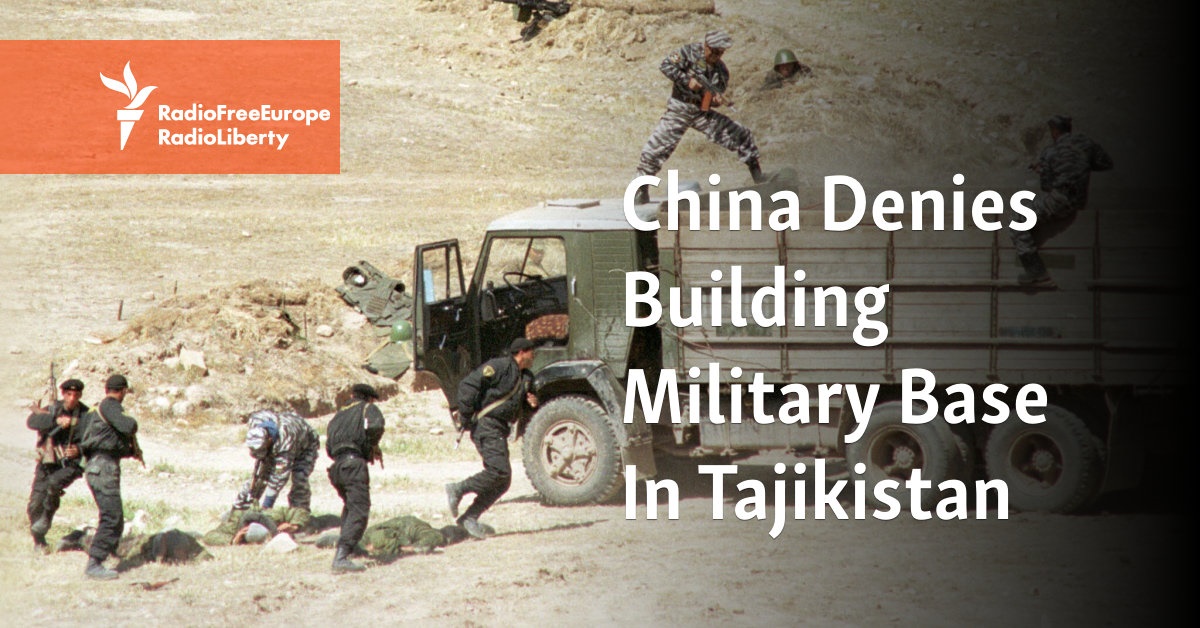Why China denies building a military base in Tajikistan
Though, China has denied that it is constructing a secret military base in Tajikistan, near areas close to Afghanistan, but reports of The Telegraph, a British daily, which are based on satellite images, maintain that Beijing is constructing the military facility for the last eight years by carving out mountains in the Central Asian nation.
“I can tell you with full confidence that China is committed to an independent foreign policy of peace and has no military base in Central Asia,” China’s Foreign Ministry Spokesperson Lin Jian said. Beijing’s denial is akin to its rebuttal of reports in 2014-15 on its construction of a military base in Djibouti in Africa.
“China had denied it was in talks for a military base until construction started in 2016—the same year the African Union had warned about foreign bases,” the Africa Centre for Strategic Studies, an academic institution of the US Department of Defence said. Taiwan’s Institute for National Defence and Security Research maintained that China began developing a military base in Tajikistan’s east, near the border with China and Afghanistan in 2016.
Daryo.uz, a news portal operating from Uzbekistan also confirmed that China is developing a military facility in the remote and mountainous region of Tajikistan, which shares a 1,357 km border with Afghanistan and a 447 km border with China’s Uighur Muslim dominated western region of Xinjiang.
Daryo.uz said China’s influence in Tajikistan is growing where more than 700 companies funded by the East Asian country are active across diverse sectors, including mines and minerals. It is Tajikistan’s largest foreign investor and a major trading partner.
The two-way trade between China and Tajikistan, as per China’s Foreign Ministry, was close to $4 billion in 2023. In the recent past, a number of China-Tajikistan joint projects have been implemented, including a cement factory in Tajikistan’s Yavan, an agriculture technology demonstration centre in Khatlon, and an agriculture and textile park in Dangara.
China’s engagement with Tajikistan received a further boost following the visit of President Xi Jinping to Dushanbe on July 4-5. During the visit, President Xi Jinping awarded the “Friendship Medal” to Tajik President Emomali Rahmon and inaugurated two buildings—one, Parliament House and second, a government building in Dushanbe.
In the course of President Xi Jinping’s official trip, the two countries vowed to further strengthen security cooperation, jointly crack down on terrorism, separatism and extremism, including the “East Turkestan Islamic Movement,” safeguard the border security of the two countries.
Strategic affairs commentators say China is using the concern of the Tajik government over the deteriorating situation in Afghanistan to build in the security sector of the Central Asian country. The ongoing construction of a secret military base by China in Tajikistan reflects this approach of Beijing in clear terms, feel strategic affairs commentators.
Lifting the veil of secrecy over China-led construction of base in Tajikistan, South China Morning Post in its report on November 7, 2021, said the proposed base would be maintained by the People’s Armed Police Force, a paramilitary branch of the Chinese armed forces and it would be “responsible for maintaining public order and combating terrorism during peacetime.”
The reality about the Chinese base in Tajikistan finds its reverberations in the article of noted Eurasian security expert, Temur Umarov. In his well- researched commentary for the Carnegie Endowment for International Peace’s portal, published on December 31, 2021, Temur Umarov said, “Technically, China indeed has no military presence in Central Asia: The Tajik sites are being built not by the People’s Liberation Army, but by the People’s Armed Police, domestic paramilitary units that are tasked with maintaining order in peacetime. However, the powers that have been granted to the armed police are continuing to grow, and in many ways resemble those of the military.”
He further said that China’s armed police, which is responsible for combating terrorism, is no longer accountable to civilian authorities. Instead, since 2018, the outfit is under the full control of China’s Central Military Council, which is the supreme military command body headed by President Xi Jinping, Temur Umarov said in his write up for Carnegie Endowment for International Peace.
Experts say both Dushanbe and Beijing deny reports about the said base and they are doing so out of fear that it could generate huge protests in Tajikistan and would impact on ongoing engagements between China and Tajikistan, including security. For China, security engagement with Dushanbe is a top priority as it will help Beijing in fighting terrorism and radicalism in Afghanistan, a country which is deep in chaos since the arrival of the Taliban in Kabul in August, 2021.













